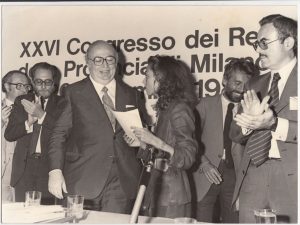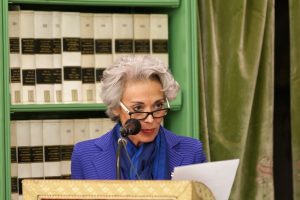NEWS A tribute to Raffaella Mortara (1958-2020)
The Italian Jewish community is mourning the passing, at the age of 62, of Raffaella Mortara, whose dedication and courage have left a mark on Italy’s cultural and political life as well as on Italian Judaism. She was a pillar for the Jewish Contemporary Documentation Centre (CDEC) in Milan, and in her youth she had long been part of Giovanni Spadolini’s secretariat, whose political fights she shared.
“She had an independent spirit; she was the youngest among us cousins. I remember how committed she was in CDEC, MEIS and politics. Politics was commonplace in her family: her father Amedeo was the co-founder of the European federalist movement; he and Raffaella’s mother Luisella were close friends of Spadolini’s, and Raffaella grew up in a cultural and politically engaged atmosphere. She was also very active in the defence of women’s rights and civil rights in general,” recalled Giorgio Mortara, vice-President of the Union of the Italian Jewish Communities, who underlined his cousin’s engagement in Judaism as well as in the civil sphere. In a book dedicated to Spadolini, she herself wrote about her relationship with the Italian politician, who was a regular guest at the Mortaras’.
 “The friendship between my family and Giovanni Spadolini – ‘the Senator’, as we used to lovingly call him at home –” wrote Raffaella Mortara, who had strongly supported the book dedicated to Spadolini, edited by Valentino Baldacci, “lasted fifteen years, until his passing. This is why it seemed only natural to us to dedicate this book to my father, Amedeo Mortara, who passed away recently – may his memory be a blessing. The book focuses on Spadolini’s work for Israel and his acknowledgement of Italian Judaism’s huge contribution to culture and civil rights over the centuries, and to Italy’s birth, development and rebirth after its ‘second Renaissance’, as the Senator loved to call the fight for national liberation against Nazi-Fascism. To my father, politics was dedication. It meant serving the whole Italian community. And it meant both dream and utopia, since his exile in Switzerland as a young pupil of Luigi Einaudi, Ernesto Rossi and Altiero Spinelli, for a truly unified, democratic and free Europe (…). Giovanni Spadolini felt exactly the same.”
“The friendship between my family and Giovanni Spadolini – ‘the Senator’, as we used to lovingly call him at home –” wrote Raffaella Mortara, who had strongly supported the book dedicated to Spadolini, edited by Valentino Baldacci, “lasted fifteen years, until his passing. This is why it seemed only natural to us to dedicate this book to my father, Amedeo Mortara, who passed away recently – may his memory be a blessing. The book focuses on Spadolini’s work for Israel and his acknowledgement of Italian Judaism’s huge contribution to culture and civil rights over the centuries, and to Italy’s birth, development and rebirth after its ‘second Renaissance’, as the Senator loved to call the fight for national liberation against Nazi-Fascism. To my father, politics was dedication. It meant serving the whole Italian community. And it meant both dream and utopia, since his exile in Switzerland as a young pupil of Luigi Einaudi, Ernesto Rossi and Altiero Spinelli, for a truly unified, democratic and free Europe (…). Giovanni Spadolini felt exactly the same.”
As Councillor of the Ferrara Museum of Italian Judaism and the Shoah’s board of directors, Mortara has dedicated herself to enhancing the role of Judaism within the Italian society. And, in particular, she did so by supporting its institutions through ideas, projects and much more. “She has always been very close to CDEC, and very generous, without people knowing,” says current CDEC’s President Giorgio Sacerdoti, who also had family ties with Raffaella. “She worked really hard to carry out some of the CDEC’s projects, among which is a study on Jewish partisans and ongoing research on Jewish MPs.” This last project was entrusted to CDEC’s Director Gadi Luzzatto Voghera, who remembers Raffaella with affection and emotion. These feelings are shared by her nephew Guido Ottolenghi, President of the Jewish Museum in Bologna.
“Raffaella will be deeply missed, but her warmth, kindness and gentle spirit will forever be in our hearts. We will remember her as a big-hearted woman, always willing to help her extended family and the Community,” said her Mortara nephews, “She has always fought so that new generations understood the importance of Remembrance of the Holocaust, bringing her family’s story into schools for International Holocaust Remembrance Day. For every Passover Seder she used to proudly read an excerpt from the book written by her grandmother Ada Ottolenghi, who, in the conclusion, encouraged her to pass on Remembrance of what happened so that it never happens again.”
Speaking of memories, Raffaella Mortara herself wrote about a touching episode which was very significant for her life and her relationship with Spadolini and CDEC. “It was a very hot day, 12th June 1991, when the first edition of the book Il libro della Memoria: gli ebrei deportati dall’Italia 1943-45 (The book of Remembrance: Jews deported from Italy 1943-45) was presented. Giovanni Spadolini, then President of the Senate, had strongly supported that event: he had always believed in the importance of cultivating memories and Remembrance, putting the due emphasis on the CDEC Foundation’s (of which my mother was president) decades-long work to retrace the story of those 8566 deportees with the utmost historical rigour and human sympathy.
Giovanni Spadolini said, ‘That flame shining on the Mount of Remembrance in Jerusalem pervades this book’s touching pages as well. It is not a book of names, nor an alphabetical list of lives which were taken in an excess of folly. Il libro della Memoria is a people of shadows watching our conscience, shaking off the numbness which is always lurking, and the indifference the conscience falls into when memory fades. A people’s future – Schlegel admonished – is always the outcome of the memory of the past. The clearer the memory, the safer the people’s future. We must cling to remembrance, because our present has its roots in it. To the unsettling question ‘what will remain of the Holocaust when the last of survivors is taken’, Il libro della Memoria answers with the agonizing and meticulous list of those names, each of which makes us grasp a life’s, a family’s, a community’s tragedy. But when collected in a volume, catalogued rigorously by alphabetical order, these names release an extraordinarily strong warning, they trace the perimeter of the cemetery where, along with the lives of millions of Jews, was buried a part of European conscience.’” A warning and a reflection, those by Raffaella Mortara, which will keep accompanying us. May her memory be a blessing.
Translated by Claudia Azzalini and revised by Mattia Stefani, both students at the Advanced School for Interpreters and Translators of Trieste University and interns at the newspaper office of the Union of the Italian Jewish Communities.

